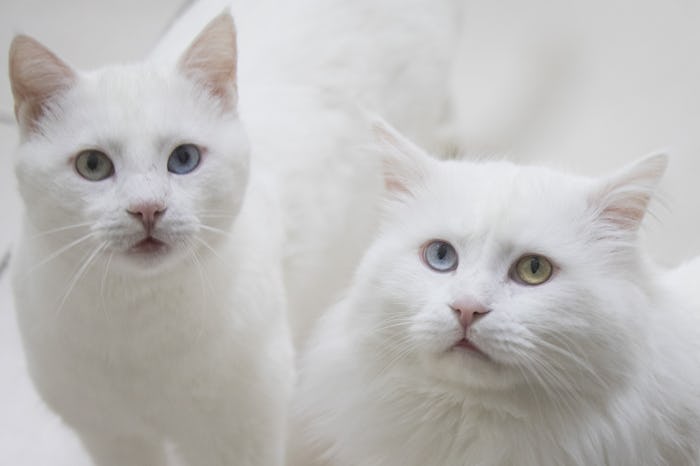Life

5 Signs Your Cat Is Stressed Out From Your Baby & Needs Some Space
Introducing your pet babies to your real baby is one of the coolest parts of parenthood. Everyone is family, finally. Unfortunately, though, not all pets take to human babies right away. Knowing the signs your cat is stressed out from your baby will help you make sure the feline in your house isn't too overwhelmed. Hey, babies really do change everything, and this goes for Fluffy's living conditions as well.
In general, giving your stressed-out cat the time and space to process this major life change is crucial. Ensuring your cat has an "out" when the baby gets noisy is especially important. "When there’s chaos or fuss around the baby, make sure your cat can get to a comfort zone — usually the place where she sleeps or catnaps,” said veterinarian Dr. Peter Kross in Pet Place. It's nothing personal, but the cat may need to escape the unfamiliar sounds and smells of the baby from time to time.
But just because your cat doesn't seem to be super enthusiastic about their new human sibling, don't panic just yet, because babies and cats can definitely learn to play together well. And there's really no threat to the old wives' tale about a cat sucking the life of a newborn — if anything, your cat is more likely to be afraid of the baby, not super aggressive toward it. With a little time and patience, your whole family, feline and human alike, can get along together famously.
1Grooming Excessively
Excessive self-grooming is a sign of extreme stress in cats, but it can sometimes be difficult to tell when they've gone too far. "Because cats groom frequently, owners usually don't notice a problem until they observe significant hair loss or skin lesions," explained Pamela Perry, DVM, animal behavior resident of the Animal Behavior Clinic at Cornell University's College of Veterinary Medicine. If your cat is experiencing significant hair loss, then a call or trip to the vet is in order.
2Hiding Constantly
Sure, it's pretty normal for a cat to hide under the bed at the first sign of fear. But if your normally social cat is still MIA several weeks after the baby arrives, then your feline friend is probably pretty stressed. In general, it's kind to let your cat hide, and refrain from forcibly removing the cat from its spot, according to Adopt A Pet. Work with your vet or an animal behavioralist to determine the best way to soothe your cat, which may involve giving kitty his own private room in the house if possible.
3Appetite Changes
Just like people, some cats experience appetite changes during times of high stress. In fact, a cat may even stop eating drastically when they're feeling anxious, as noted by PetMD. If your cat experiences rapid weight loss and keeps snubbing food, then see your vet for help. If other medical conditions are ruled out, then your cat may be refusing food out of extreme stress.
4Increased Vocalization
Depending on your cat, this sign could be the most endearing (or annoying) one of all. However you feel about it, increased vocalization in cats sometimes results from stress, according to the Cummings School of Veterinary Medicine at Tufts University. Try to see if your cat is displaying other signs that they are not adjusting well or acting like their normal selves since the baby's arrival.
5Urinating In The Crib
This does not appear to be a super common reaction, thankfully. But a very stressed cat may try to urinate in the baby's crib, as noted in Pets WebMD. To prevent this possibility, keep the door to the baby's nursery shut, or use a crib tent to keep the cat out. Of course, any time your cat is urinating outside the litter box is problematic, so you may want to contact your vet for assistance with this issue.
Check out Romper's new video series, Bearing The Motherload, where disagreeing parents from different sides of an issue sit down with a mediator and talk about how to support (and not judge) each other’s parenting perspectives. New episodes air Mondays on Facebook.